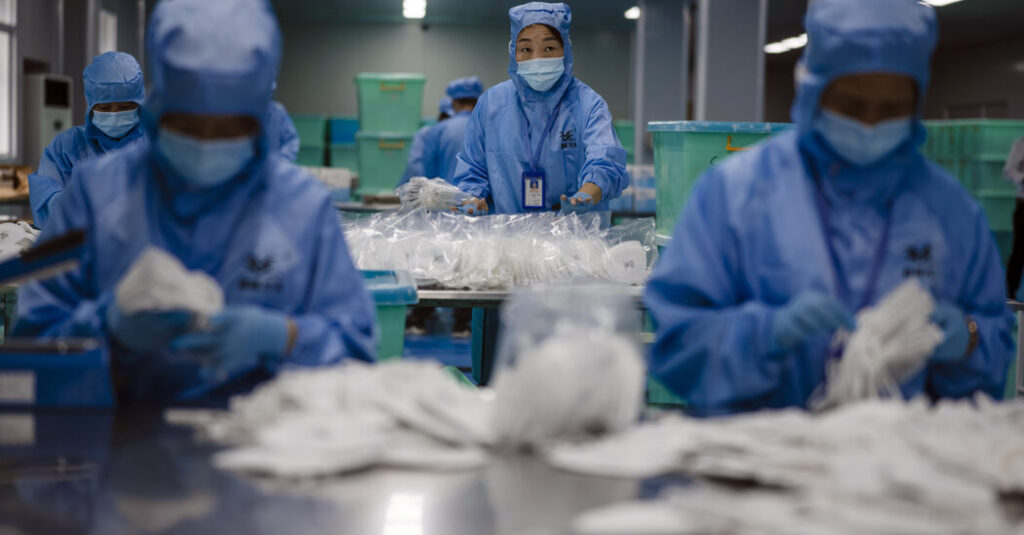Few domestic sectors have suffered as severely from the influx of inexpensive Chinese imports as the manufacturers of face masks, exam gloves, and other disposable medical equipment that safeguards healthcare workers from infectious diseases.
This industry’s decline had disastrous effects during the Covid pandemic when China halted exports, leaving American healthcare professionals vulnerable to a harmful airborne virus that quickly overwhelmed the nation’s hospitals and morgues.
However, as President Trump introduced his tariff plan earlier this month, and China responded with an 84 percent tax on American imports, the few remaining U.S. manufacturers of protective gear were mostly anxious.
“I’m really worried,” said Lloyd Armbrust, CEO of Armbrust American, a startup from the pandemic that manufactures N95 respirator masks in Texas. “While this may be the approach we need to become independent from China, it’s not a responsible approach to industrial policy.”
The United States used to lead the market in personal protective equipment (P.P.E.). The N95 mask and disposable nitrile glove were American innovations, yet currently, over 90 percent of the medical supplies used by U.S. healthcare workers are produced in China.
In spite of bipartisan commitments to reduce the nation’s reliance on foreign medical supplies and support the many domestic manufacturers that emerged during the pandemic, federal agencies have returned to inexpensive Chinese imports. Experts in the field express concern about this renewed dependence, especially with a growing measles outbreak, the risk of avian flu, and a trade conflict with China that could disrupt global supply chains.
“It’s the same story repeating itself,” remarked Mike Bowen, whose company, Prestige Ameritech, was one of the few remaining U.S. mask producers before the pandemic and has repeatedly alerted Congress about the dangers of depending on foreign-made P.P.E.
Bowen, who stepped down four years ago but remains a stakeholder in Prestige Ameritech, noted that the ups and downs of the American P.P.E. industry over recent years were completely predictable. “We didn’t learn anything,” he said.
Disturbed by images of nurses in trash bags, John Bielamowicz, a Texas commercial real estate agent, partnered with a friend to launch a factory for N95 masks near Fort Worth, investing hundreds of thousands in machinery capable of producing 1.2 million masks monthly.
“It felt like the right decision,” shared Mr. Bielamowicz, whose company, United States Mask, was one of over 100 startups that emerged during the anxious first year of the pandemic.
Five years later, United States Mask and the majority of these startups have vanished. The decline was largely caused by diminished demand for P.P.E. as the pandemic waned and masks were viewed by many as a symbol of governmental overreach and loss of freedoms. The final blow was seemingly destined: the resurgence of Chinese-made equipment.
Only five out of the 107 companies founded during the pandemic are still manufacturing masks and gloves, according to a review by the American Medical Manufacturers Association.
Eric Axel, the association’s executive director, stated that if tariffs on Chinese protective gear remain high, American manufacturers might gain an advantage. “I believe it will change consumer habits, as people will adapt to the reality that the below-market prices from China aren’t going to be available anymore,” he said.
Yet, other industry leaders worry that escalating retaliatory actions from the U.S. and China could cause supply chain disruptions and a return to P.P.E. shortages. Many express that the economic uncertainty arising from Trump’s tariffs might deter new investments.
“It’s hard to make business decisions when policies shift every four years, and now even every few days,” said Scott McGurl, a healthcare market specialist at Grant Thornton.
Given the capability of Chinese manufacturers, supported by their government, to bypass trade restrictions, many executives doubt that tariffs will have a prolonged effect. They argue that legislative and policy measures must compel government agencies and hospital networks to prefer American-made masks and gloves.
“Even with a 100 percent tariff, the Chinese masks priced at a penny will still be cheaper than the American ones priced at eight cents,” Mr. Armbrust pointed out.
The hopeful narrative of how charitable entrepreneurship responded to a serious public health crisis wasn’t expected to conclude this way.
Political figures from both parties had pledged to ensure that the nation would never again depend on foreign-manufactured medical supplies. The Defense Department allocated $1.3 billion to assist American companies in producing N95 masks and nitrile gloves domestically.
In 2021, Congress wrote legislation aimed at making sure federal agencies gave priority to buying domestically produced medical supplies to support the industry through the fluctuations in demand.
This approach mirrors what the Pentagon has long adopted, investing hundreds of billions of dollars annually on contracts that sustain defense-related firms in peace and wartime.
However, the P.P.E. provisions included in the Infrastructure Investment and Jobs Act of 2021 had loopholes that experts say undermined its effectiveness, as federal agencies sought exemptions to procure cheaper imports.
When Mr. Axel of the manufacturer’s association recently passed through John F. Kennedy International Airport in New York, he was astonished to see that the masks at a federal health screening area were manufactured in China.
“Our national security is compromised because we’ve again placed ourselves at the mercy of adversarial, nondemocratic nations,” he expressed.
Mr. Trump has not mentioned personal protective equipment since returning to office, but during his previous term, he frequently highlighted the need to reduce dependence on foreign manufacturing.
The country has been relying on imported medical supplies as part of the “America First” economic strategy.
In May 2020, while at a Pennsylvania mask factory run by Owens & Minor, he stated, “No president should ever inherit empty shelves again. My vision is for America to self-sufficiently produce all necessary supplies and then export to other nations.”
Experts opine that the tariffs introduced by Mr. Trump on Chinese imports during his first term did little to create a fair market, primarily due to substantial industrial support from Beijing that allowed Chinese firms to sustain their price edge.


